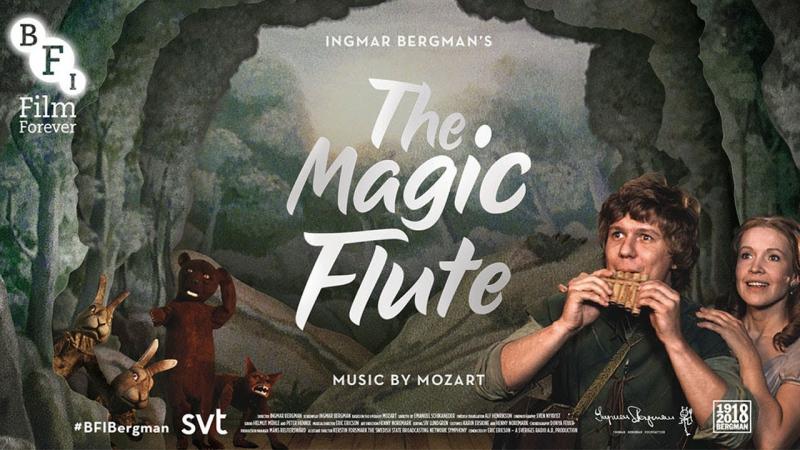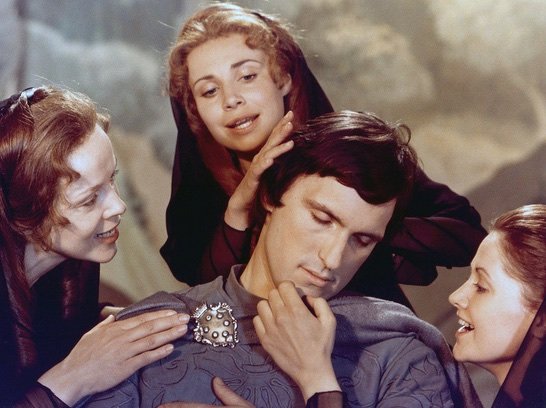DVD/Blu-ray: Bergman's The Magic Flute | reviews, news & interviews
DVD/Blu-ray: Bergman's The Magic Flute
DVD/Blu-ray: Bergman's The Magic Flute
Pretty start, heart of darkness: the greatest of all opera films now available to UK viewers

Opera on film's most magical offering, better by some way than Joseph Losey's cinematically tricksy Don Giovanni, at last makes it to Region 2 in this BFI dual-format release.
I disagree with Sameer Rahim's booklet essay that there is nothing of the "dark retelling" about it; once past the "family of man" audience faces (some very familiar) shown during the Overture, Bergman starts in a studio replica of Drottningholm's 18th century theatre, only to takes us behind and below the stage illusion as photogenic Josef Köstlinger's Prince Tamino (pictured below with the Three Ladies) and Irma Urrila's Pamina embark on some stygian and even frightening trials.
What's funny is delightful, thanks to a young Håkan Hagegård's innocent Papageno and some cuddly beasts to respond to Tamino's flute. But by making Pamina's guardian Sarastro her father, divorced from her mother The Queen of the Night, Bergman heightens the dissension and tension that need to be resolved. Which he does with a drastically reordered Act 2 finale, the only element over which Mozartians might quibble. My own quibbles are not over the film but the booklet and the extras. With the original LP set of Trollflöjten, the Swedish-language version, came rehearsal stills and a revelatory commentary from Bergman which I've not seen reproduced elsewhere; the essay and a review contemporary with the 1975 release here are no substitute. And it's essential that at some point we get the documentary about the making of the film, which I have, but with French subtitles.
My own quibbles are not over the film but the booklet and the extras. With the original LP set of Trollflöjten, the Swedish-language version, came rehearsal stills and a revelatory commentary from Bergman which I've not seen reproduced elsewhere; the essay and a review contemporary with the 1975 release here are no substitute. And it's essential that at some point we get the documentary about the making of the film, which I have, but with French subtitles.
The extras here are curious rather than indispensable, though I'm delighted to see Anthony Asquith's 1955 half-hour curiosity On Such a Night in which a young American, travelling down to the Sussex Downs, hears dinner-jacketed gentleman on the train from Victoria wondering about "the new Countess" and finds himself at Glyndebourne watching The Marriage of Figaro. Anyone who's enjoyed The Moderate Soprano will be fascinated to see John Christie and director Carl Ebert in the flesh, as well as scenes from the production then in play.
rating
Share this article
Add comment
The future of Arts Journalism
You can stop theartsdesk.com closing!
We urgently need financing to survive. Our fundraising drive has thus far raised £49,000 but we need to reach £100,000 or we will be forced to close. Please contribute here: https://gofund.me/c3f6033d
And if you can forward this information to anyone who might assist, we’d be grateful.

Subscribe to theartsdesk.com
Thank you for continuing to read our work on theartsdesk.com. For unlimited access to every article in its entirety, including our archive of more than 15,000 pieces, we're asking for £5 per month or £40 per year. We feel it's a very good deal, and hope you do too.
To take a subscription now simply click here.
And if you're looking for that extra gift for a friend or family member, why not treat them to a theartsdesk.com gift subscription?

Comments
After seeing it for, I think,
It is a great opera film -
in your opinion. But the
in your opinion. But the edition used is the sticking-point, especially for the Giulietta act. Hugely imaginative, I'd agree. But no-one would claim Offenbach's Hoffmann goes as deep as Mozart's The Magic Flute.